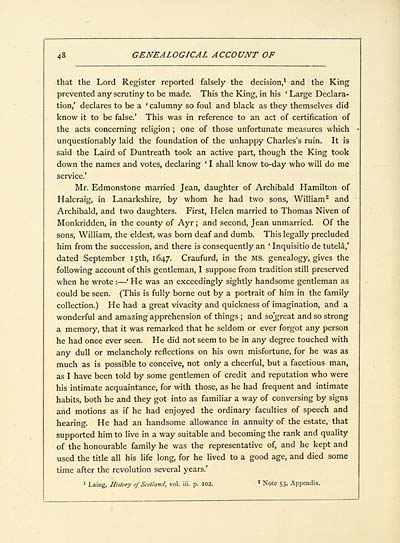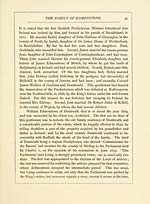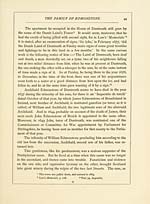Download files
Complete book:
Individual page:
Thumbnail gallery: Grid view | List view

48 GENEALOGICAL ACCOUNT OF
that the Lord Register reported falsely the decision, 1 and the King
prevented any scrutiny to be made. This the King, in his ' Large Declara-
tion,' declares to be a ' calumny so foul and black as they themselves did
know it to be false.' This was in reference to an act of certification of
the acts concerning religion ; one of those unfortunate measures which
unquestionably laid the foundation of the unhappy Charles's ruin. It is
said the Laird of Duntreath took an active part, though the King took
down the names and votes, declaring ' I shall know to-day who will do me
service.'
Mr. Edmonstone married Jean, daughter of Archibald Hamilton of
Halcraig, in Lanarkshire, by whom he had two sons, William 2 and
Archibald, and two daughters. First, Helen married to Thomas Niven of
Monkridden, in the county of Ayr ; and second, Jean unmarried. Of the
sons, William, the eldest, was born deaf and dumb. This legally precluded
him from the succession, and there is consequently an ' Inquisitio de tutela,'
dated September 15th, 1647. Craufurd, in the MS. genealogy, gives the
following account of this gentleman, I suppose from tradition still preserved
when he wrote : — ' He was an exceedingly sightly handsome gentleman as
could be seen. (This is fully borne out by a portrait of him in the family
collection.) He had a great vivacity and quickness of imagination, and a
wonderful and amazing apprehension of things ; and so'great and so strong
a memory, that it was remarked that he seldom or ever forgot any person
he had once ever seen. He did not seem to be in any degree touched with
any dull or melancholy reflections on his own misfortune, for he was as
much as is possible to conceive, not only a cheerful, but a facetious man,
as I have been told by some gentlemen of credit and reputation who were
his intimate acquaintance, for with those, as he had frequent and intimate
habits, both he and they got into as familiar a way of conversing by signs
and motions as if he had enjoyed the ordinary faculties of speech and
hearing. He had an handsome allowance in annuity of the estate, that
supported him to live in a way suitable and becoming the rank and quality
of the honourable family he was the representative of, and he kept and
used the title all his life long, for he lived to a good age, and died some
time after the revolution several years.'
1 Laing, History of Scotland, vol. iii. p. 102. J Note 53, Appendix.
that the Lord Register reported falsely the decision, 1 and the King
prevented any scrutiny to be made. This the King, in his ' Large Declara-
tion,' declares to be a ' calumny so foul and black as they themselves did
know it to be false.' This was in reference to an act of certification of
the acts concerning religion ; one of those unfortunate measures which
unquestionably laid the foundation of the unhappy Charles's ruin. It is
said the Laird of Duntreath took an active part, though the King took
down the names and votes, declaring ' I shall know to-day who will do me
service.'
Mr. Edmonstone married Jean, daughter of Archibald Hamilton of
Halcraig, in Lanarkshire, by whom he had two sons, William 2 and
Archibald, and two daughters. First, Helen married to Thomas Niven of
Monkridden, in the county of Ayr ; and second, Jean unmarried. Of the
sons, William, the eldest, was born deaf and dumb. This legally precluded
him from the succession, and there is consequently an ' Inquisitio de tutela,'
dated September 15th, 1647. Craufurd, in the MS. genealogy, gives the
following account of this gentleman, I suppose from tradition still preserved
when he wrote : — ' He was an exceedingly sightly handsome gentleman as
could be seen. (This is fully borne out by a portrait of him in the family
collection.) He had a great vivacity and quickness of imagination, and a
wonderful and amazing apprehension of things ; and so'great and so strong
a memory, that it was remarked that he seldom or ever forgot any person
he had once ever seen. He did not seem to be in any degree touched with
any dull or melancholy reflections on his own misfortune, for he was as
much as is possible to conceive, not only a cheerful, but a facetious man,
as I have been told by some gentlemen of credit and reputation who were
his intimate acquaintance, for with those, as he had frequent and intimate
habits, both he and they got into as familiar a way of conversing by signs
and motions as if he had enjoyed the ordinary faculties of speech and
hearing. He had an handsome allowance in annuity of the estate, that
supported him to live in a way suitable and becoming the rank and quality
of the honourable family he was the representative of, and he kept and
used the title all his life long, for he lived to a good age, and died some
time after the revolution several years.'
1 Laing, History of Scotland, vol. iii. p. 102. J Note 53, Appendix.
Set display mode to:
![]() Universal Viewer |
Universal Viewer | ![]() Mirador |
Large image | Transcription
Mirador |
Large image | Transcription
Images and transcriptions on this page, including medium image downloads, may be used under the Creative Commons Attribution 4.0 International Licence unless otherwise stated. ![]()
| Histories of Scottish families > Genealogical account of the family of Edmonstone of Duntreath > (66) |
|---|
| Permanent URL | https://digital.nls.uk/95354247 |
|---|
| Description | A selection of almost 400 printed items relating to the history of Scottish families, mostly dating from the 19th and early 20th centuries. Includes memoirs, genealogies and clan histories, with a few produced by emigrant families. The earliest family history goes back to AD 916. |
|---|

